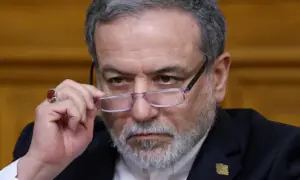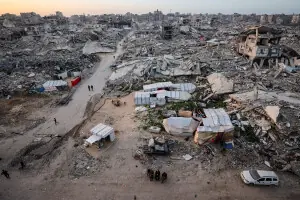India exposed as global supplier of illicit drug
4 min readA recent report from the US Office of the Director of National Intelligence highlighted India’s rising involvement in the illicit fentanyl trade, a development that raised concerns in New Delhi, CNN reported.
This finding came at a time when President Trump imposed tariffs on nations he accused of failing to combat the flow of this deadly drug into the United States.
Fentanyl, a potent synthetic opioid, was known to be up to 100 times stronger than morphine and was a leading contributor to overdose deaths in the US.
The opioid crisis became a critical issue for the Trump administration, prompting heightened scrutiny of countries linked to the drug trade.
Historically, China had been the dominant source of both legal and illegal fentanyl supplies, providing precursor chemicals that were typically processed in Mexican labs before being smuggled into the US.
However, the 2025 Annual Threat Assessment (ATA) indicated that India was increasingly playing a significant role in this illicit market.
The report stated, “Nonstate groups were often enabled, both directly and indirectly, by state actors, such as China and India as sources of precursors and equipment for drug traffickers.”
It emphasized that while China remained the primary source of illicit fentanyl precursor chemicals and pill-pressing equipment, India quickly became a notable contender.
Last year’s ATA report named India as one of the countries, other than China, where Mexican cartels had sourced precursor chemicals to a “lesser extent.” The 2023 report made no mention of India in relation to fentanyl.
India was a global leader in generic drug manufacturing, supplying a significant portion of the world’s vaccines and medicines. The country had a pharmaceutical industry so large that it was often referred to as the “Pharmacy of the World.” However, the industry was marred by controversy, raising concerns about regulation and quality control.
On March 17, India’s Anti-Terrorist Squad (ATS) in the western state of Gujarat announced that it had arrested two people linked to Surat-based pharmaceutical companies for allegedly exporting illicit fentanyl precursors to Mexico and Guatemala, according to the Press Trust of India. CNN reached out to the ATS for further information.
Days later, the US Department of Justice indicted three top executives from a Hyderabad-based pharmaceutical company for allegedly importing ingredients used to make illicit fentanyl.
New Delhi had not publicly spoken about the ATA report. CNN contacted India’s Ministry of External Affairs for a response.
The report came at a delicate time for India as it mounted a case to avoid US tariffs.
The US was India’s largest trading partner in 2024, accounting for almost $120 billion in trade, yet India only ranked tenth in the list of US trading partners for the same year.
Indian economist and researcher Soumya Bhowmik noted that the ATA report “may have introduced complexities in India-US relations” and could “have opened the door for tougher rhetoric and potentially even targeted tariffs.”
Earlier that month, the Trump administration enacted tariffs against the US’ top three trading partners: China, Mexico, and Canada, stating that the levies of up to 25% were necessary to stem the flow of fentanyl into the US.
Indian Prime Minister Narendra Modi visited Washington in February, where he spoke with Trump about a range of issues from defense and technology to trade and economic growth.
The two leaders “resolved to expand trade and investment to make their citizens more prosperous, nations stronger, economies more innovative, and supply chains more resilient,” as stated in a joint statement from that meeting.
A Washington delegation was currently in New Delhi for trade talks.
India had “proactively undertaken measures to respond to potential trade tensions and mitigate the impact of impending US tariffs,” Bhowmik said, including a proposal to remove import duties on goods essential for manufacturing.
The ATA report also “highlighted the critical importance of collaborative efforts between (the US and India) to address the global opioid crisis,” Bhowmik remarked.
Read more
India aims to strengthen economic ties with US, engage with Trump administration
Trump says US has approved extradition of suspect in 2008 Mumbai attacks
India considers tariff reductions on over half of US imports worth $23b, says report
For the latest news, follow us on Twitter @Aaj_Urdu. We are also on Facebook, Instagram and YouTube.

























Comments are closed on this story.